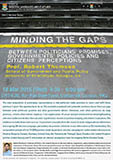The main proposition of promissory representation is that politicians make promises to voters and fulfill those promises if given the opportunity to do so. The available anecdotal and systematic evidence shows there are gaps between what politicians’ promise and what governments deliver. Moreover, even when politicians do keep promises, citizens often remain skeptical. I test explanations of actual and perceived promise-keeping/breaking with new evidence that describes variation in politicians’ records of promise-keeping and citizens’ evaluations. The evidence includes three main sources: 1) prominent examples from the recent Scottish independence referendum and ongoing UK election campaign, particularly the promise to hold an in-out referendum on EU membership; 2) a comparative analysis of over 14,000 promises made by parties in election campaigns in twelve western democracies (Austria, Bulgaria, Canada, Germany, Ireland, Italy, the Netherlands, Portugal, Spain, Sweden, the United Kingdom and the United States); and 3) information on citizens’ perceptions from the ongoing British Election Study.
Robert Thomson is Professor of Politics. His research focuses on decision-making, negotiations, policy implementation and empirical assessments of democratic theory. His recent research focuses on two distinct areas: the politics and policies of the European Union and international comparisons of representation. He is author of the book Resolving Controversy in the European Union and co-editor/author of The European Union Decides (both Cambridge University Press). His work has appeared in journals such as the British Journal of Political Science, Comparative Political Studies, European Union Politics, the European Journal of Political Research, the Journal of European Public Policy and the Journal of Politics.

